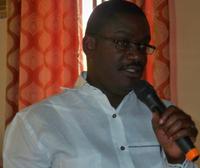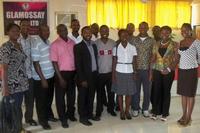On 13 and 14 March 2012, WASHCost Ghana hosted a training session on the life-cycle cost approach in order to help participants—especially district water and sanitation teams, district planners, and district directors, with their planning and budgeting of WASH services.
Published on: 20/03/2012
A training workshop on Life Cycle Cost Approach (LCCA) of costing and budgeting for water, sanitation and hygiene (WASH) services has taken place in the Brong Ahafo Region at Sunyani on the 13th and 14th March 2012.
The two-day training session aimed at equipping the participants, especially District Water and Sanitation Teams, the District Planners and District Directors to be able to plan and adequately budget for WASH services in their districts to ensure their sustainability.
Participants were drawn from the Dormaa East, Berekum and Sunyani West District Assemblies. Each district present three participants made up of District Directors or their deputies, District Planners and District Water and Sanitation Officers.

Speaking at the training session, the Brong Ahafo Regional Director for the Community Water and Sanitation Agency, Mr. E. F. Boateng, entreated the participants to learn the rudiments of the various costing elements in the life cycle costing approach be able to properly cost their activities. Adding this will support ensure the sustainability of WASH services in their districts.
The LCCA training is jointly organized by the WASHCost and Triple-S Projects.Country Coordinator for WASHCost Project Ghana, Mr. Alexander Obuobisa-Darko, explaining the purpose of the workshop to the participants stated that the life cycle cost is about how to properly cost to cover certain activities in the water, sanitation and hygiene (WASH) budget, such as monitoring of systems, fuel for vehicles, vehicle maintenance for DWST, planners or the environmental health officers who may undertake post construction monitoring activities. He said if these activities are properly costed for, it will ensure that WASH systems deliver the desired service.

Facilitating the training session, the Country Director for WASHCost Project Ghana, Dr. Kwabena Nyarko, explained the various cost components in the LCCA to the participants. This, he said, goes beyond the initial cost of investments(constructing new facilities) and gave other cost components that form the total cost of ensuring sustained service delivery as follows:
Dr. Nyarko said "The methodology is the outcome of an action research by IRC (WASHCost) with its partners and has come out with what actually constitutes the cost of WASH service provision. He said “so far the methodology has been tested in all WASHCost countries namely Ghana, Mozambique, Burkina Faso and India”.
Dr. Nyarko took participants through a number of exercises to enable them understand the LCCA concept. They were made to identify the various cost elements/components, group the various cost items under the cost components. At the end of the workshop, participants grouped in their districts, drew a model WASH budget for their districts using the LCCA.
The next two training workshops would be held for the Volta and Northern regions in March and April 2012 respectively.
